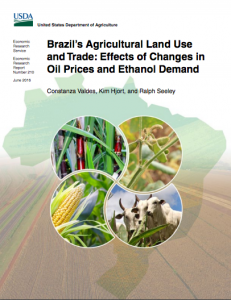The U.S. Department of Agriculture (USDA) has released a new report, “Brazil’s Agricultural Land Use and Trade: Effects of Changes in Oil Prices and Ethanol Demand“. The study looked at the issue of land-use changes in Brazil as westward expansion of agriculture, especially in the Cerrados Savannah region, continues in an effort to grow more food and produce more fuels such as ethanol, and meet expanding needs of sugarcane.
Authors C onstanza Valdes, Kim Hjort and Ralph Seeley also looked at the link between the demand for ethanol and petroleum and how oil prices can affect production and land-use decisions for ethanol feedstocks, and other ag commodities. Ultimately, this study examined how longrun changes in oil prices could affect Brazilian ethanol production and resulting cropping patterns. It also considered the implications for world agricultural markets.
onstanza Valdes, Kim Hjort and Ralph Seeley also looked at the link between the demand for ethanol and petroleum and how oil prices can affect production and land-use decisions for ethanol feedstocks, and other ag commodities. Ultimately, this study examined how longrun changes in oil prices could affect Brazilian ethanol production and resulting cropping patterns. It also considered the implications for world agricultural markets.
The study examined the effects of two oil-price scenarios—sustained high prices and sustained low prices from 2015 to 2024—on Brazilian agricultural land use. A reference scenario is based on the assumptions in USDA’s Agricultural Projections to 2024.
In the high-priced scenario: In this scenario, the oil price rises 40 percent above the reference, or baseline, price in 2015, followed by another 7-percent increase in 2016 and small changes relative to the baseline price thereafter through 2024 (for a sustained average increase of 45 percent above the base price). With increasing oil prices, the demand for ethanol increases relative to that for gasoline, raising the price of ethanol and creating incentives to increase production.
In the low-priced scenario: In this scenario, the oil price decreases 18 percent below the reference price in 2015, followed by 6-percent declines over the next 2 years and a 1-percent annual decline thereafter through 2024. A sustained fall in oil prices would be expected to trigger a drop in demand for ethanol as well as a drop in prices for agricultural inputs (energy, fertilizer, etc.). In this scenario, ethanol use in Brazil falls by an average of 16 percent annually in 2015-24.

